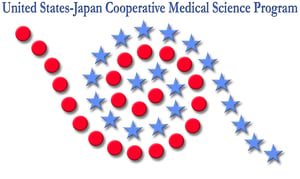
The Joint 24th International Conference on Emerging Infectious Diseases in the Pacific Rim of the U.S.-Japan Cooperative Medical Sciences Program (USJCMSP) in collaboration with the 2nd International Symposium for Infectious Diseases Research Institutes Cooperation (IDRIC)
.png?width=125&height=125&name=logo1%20(003).png)
.png?width=125&height=110&name=NIH_Master_Logo_Vertical_2Color-PNG%20(002).png)

-1.png?width=250&name=IVI_logo%20(002)-1.png)
Viral Diseases Panel Agenda
Thursday| 7 March 2024 | DAY THREE
8:30-9:00 | Registration
9:00-9:05 | Welcome Remarks
_____________________________________________________________
SESSION ONE: Rabies
Moderator: Akira Nishizono
9:05-9:30 | Exploring Host Gene Expression Dynamics in Lymph Node Inoculated with Different Pathogenic Rabies Virus | Kazunori Kimitsuki, Oita University, Japan
_____________________________________________________________
SESSION TWO: Hemorrhagic Viruses
Moderator: Asika Nanbo
9:30-9:55 | The role of the NP as a Type I interferon antagonist in the Arenavirus replication | Shuza Urata, Nagasaki, Japan
9:55-10:20 | Overview of the Institute Pasteur Korea | Sung Key Jang, Institute Pasteur Korea, South Korea
_____________________________________________________________
10:20-11:00 | Coffee Break
_____________________________________________________________
11:00-11:25 | Analysis of host factors on viral replication cycle of Crimean-Congo hemorrhagic fever virus | Minato Hirano, Nagasaki, Japan
11:25-11:50 | Severe Fever with Thrombocytopenia Syndrome Virus: Prevalence and its age-dependent pathogenesis | Choi Young Ki, KVRI, South Korea
11:50-12:05 | Flash Talks | 3-5 Minutes Each
- Morphological and Pathological Features of Oita Virus, a Bat-Borne Rhabdovirus | Sakirul Khan (Oita University, Japan)
- Development of a visualizing system for the Ebola virus glycoprotein | Wakako Furuyama (Nagasaki University, Japan)
-
Substitution of E1497K in L protein changes plaque phenotype and growth kinetics of Guanarito virus S-26764 strain | Satoshi Taniguchi (NIID, Japan)
_____________________________________________________________
12:05-13:25 | Lunch & Poster Viewing
_____________________________________________________________
SESSION THREE: Enteric Viruses
Moderator: Craig Cameron & Takeshi Kobayashi
13:30-13:55 | Neonatal Fc receptor works as a classical human astrovirus receptor | Kei Haga (Kitasato University, Japan)
13:55-14:20 | Development of therapeutics to treat infection by RNA viruses | Craig Cameron, University of North Carolina, USA
14:20-14:45 | Do nutrients also help norovirus to infect in the small intestine? | Sakura Kobayashi - National Institute of Infectious Diseases, Japan
_____________________________________________________________
14:45-15:15 | Break
_____________________________________________________________
15:15-15:40 | The last hurdles on the path to poliovirus eradication and new tools to achieve it | Ondrej Mach, World Health Organization, Switzerland virtual
15:40-16:05 | Enabling high dose RNA vaccination for development of a multivalent enterovirus vaccine | Jesse Eramus, HDT Bio, USA
16:05-16:20| Flash Talks | 3-5 Minutes Each
- Dissection of the mechanism of rotavirus inclusion body formation with a focus on viral NSP2 protein | Tomohiro Kotaki, Osaka University, Japan
- Genetic engineering strategy for generating a stable dsRNA virus vector using a virus-like codon-modified transgene | Yuta Kanai, Osaka University, Japan
- Development of in vitro - assembled multivalent VLP vaccine for norovirus infection | Deog-Young Choi, InThera Inc., South Korea
_____________________________________________________________
SESSION FOUR: Arboviruses
Moderator: Richard Kuhn & Hiroaki Kariwa
16:20-16:45 | Beyond retroviruses: new effector functions for the antiviral restriction factor, TRIM5 | Sonja Best, National Institute of Allergy and Infectious Disease, RML, USA
16:45-17:10 | Zika virus NS5 forms nuclear-body structures via conjugation to small ubiquitin-like modifier on a lineage-specific lysine to modulate virus pathogenicity | Dimitri Lavillette, Pastuer, South Korea
_____________________________________________________________
Friday| 8 March 2024 | DAY FOUR
_____________________________________________________________
SESSION FOUR: Arboviruses continued
Moderator: Richard Kuhn
8:30-8:55 | West Nile virus capsid protein induces nuclear membrane loss and promotes viral replication | Shintaro Kobayashi, Hokkaido, Japan
8:55-9:20 | Structural and biochemical studies of flaviviruses in complex with antibodies and attachment factors | Richard Kuhn, Purdue University, USA
9:20-9:45 | Longitudinal analysis of Dengue virus-1 (DENV-1) infection induced cross-neutralization and antibody-dependent enhancement activity across genotypes levels and T-cell epitopes | Moi Meng Ling, University of Tokyo, Japan
_____________________________________________________________
9:45-10:25 | Coffee Break
_____________________________________________________________
SESSION FIVE: Bat Immunology & Zoonotic Viruses
Moderator: Eun-Chung Park
10:25-10:50 | Studies of MPOX | Anne Rimion, University of California Los Angelas, USA (virtual)
10:50-11:15 | Poxvirus sabotage of T-cell co-stimulation | Daved Fremont, Washington University, USA
11:15-11:40 | Antiviral immunity of the Australian black flying fox to Hendra virus | Michelle Baker, Centre for Disease Preparedness, Australia
11:40-12:05 | Understanding persistence of potentially zoonotic, bat-borne henipaviruses in Madagascar | Cara Brook, University of Chicago, USA
12:05-12:30 | Niemann-Pick C1 heterogeneity and filovirus tropism to bat cells | Ayato Takada, Hokkaido University, Japan
12:30-12:40 | CLOSING REMARKS
_